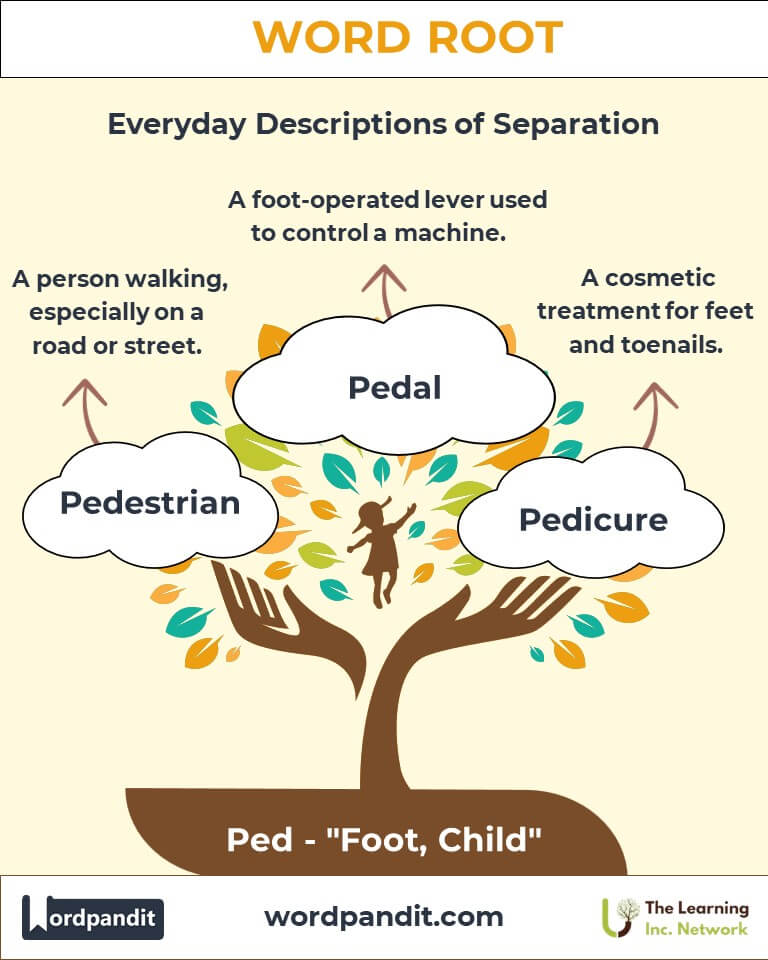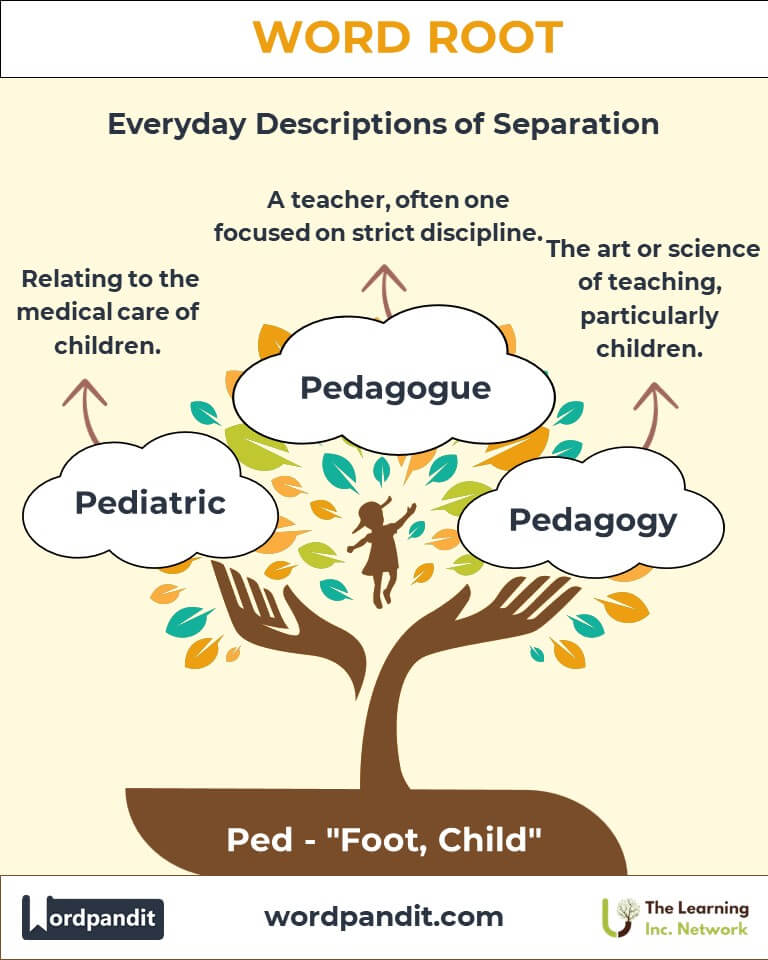Ped: The Dual Root of Motion and Care in Language
Byline:
The root "ped," derived from Latin and Greek origins, carries the dual meaning of "foot" (Latin) and "child" (Greek). This linguistic cornerstone underpins words that describe physical movement, like "pedestrian," and those linked to nurturing or growth, such as "pediatric." Journey with us as we explore the versatile impact of "ped" across language, culture, and specialized fields.

Table of Contents
- Introduction: The Multifaceted Ped
- Etymology and Historical Journey
- Mnemonic: Unlocking the Power of Ped
- Common Ped-Related Terms
- Ped Through Time
- Ped in Specialized Fields
- Illustrative Story: Ped in Action
- Cultural Significance of Ped
- The Ped Family Tree
- FAQs about the Ped Root
- Test Your Knowledge: Ped Mastery Quiz
- Conclusion: The Living Legacy of Ped
Introduction: The Multifaceted Ped
What connects the footsteps of a pedestrian to the care of a pediatrician? The answer lies in the root "ped," pronounced "ped." With dual meanings—"foot" from Latin and "child" from Greek—this root plays a pivotal role in diverse vocabularies. Whether referring to physical journeys or the nurturing of young lives, "ped" symbolizes both movement and growth.

Etymology and Historical Journey
The root "ped" traces its lineage to two linguistic streams:
- Latin pedis: Meaning "foot," it forms the foundation for terms like "pedestrian" and "pedal."
- Greek pais (paidos): Meaning "child," it gives rise to words like "pediatric" and "pedagogy."
Historically, "ped" reflected the societal importance of both mobility and education. The Roman Empire’s focus on road-building highlighted the "foot" aspect, while Greek philosophers emphasized teaching and child-rearing.
Mnemonic: Unlocking the Power of Ped
Imagine a child (ped) walking (ped) hand-in-hand with a teacher, embodying both "foot" and "child."
Mnemonic Device:
"Pedestrian feet pave paths, while pediatrics care for tiny feet."
Common Ped-Related Terms
- Pedestrian: A person walking, especially on a street or road.
Example: "The city added crosswalks to protect pedestrians." - Pediatric: Relating to the medical care of children.
Example: "The pediatric ward was full of cheerful decorations." - Pedal: A lever operated by foot to control a machine, like a bicycle.
Example: "He pushed the pedal harder to climb the steep hill." - Pedagogue: A teacher, often one focused on strict discipline.
Example: "The pedagogue inspired students with creative lessons." - Pedicure: A cosmetic treatment for the feet and toenails.
Example: "She treated herself to a relaxing pedicure."
Ped Through Time
- Pedestrian (Ancient Rome): Originally describing foot-travelers on Roman roads, this term now reflects modern urban mobility.
- Pediatric (19th Century): Coined as medicine specialized, pediatrics emerged to address child-specific health needs.
- Pedagogy (Evolution): Once meaning "child guidance," pedagogy now encompasses diverse teaching methods.
Ped in Specialized Fields
- Medicine: Pediatrician—Specialists ensure children’s growth and health.
- Urban Planning: Pedestrian Zones—Spaces designed for walking improve city livability.
- Engineering: Pedals—Foot-operated mechanisms are central to bikes and cars.
- Education: Pedagogy—Innovative teaching methods enhance learning experiences.
Illustrative Story: Ped in Action
Emma, a pediatrician, enjoyed walking to her clinic through a pedestrian-friendly park. She greeted her neighbor fixing bike pedals before entering her office to treat young patients. That day, she taught a new mother about baby care, showcasing the seamless connection between "ped" as both "foot" and "child."
Cultural Significance of Ped
From pedestrian-friendly cities symbolizing sustainability to the reverence for educators shaping young minds, "ped" reflects universal values of movement and care. Celebrations like World Teachers’ Day honor the root's "child" aspect, while pedestrian zones in cities emphasize safe, communal spaces.

The Ped Family Tree
- Pod (Greek: "foot")
- Example: Podiatrist—A foot doctor.
- Paed (Greek: "child")
- Example: Paediatrician—British spelling for pediatrician.
- Path (Greek: "path")
- Example: Pathway—A route for walking.

FAQs About the "Ped" Word Root
Q: What does "ped" mean?
A: The root "ped" has two meanings:
- From Latin, it means "foot," as seen in words like "pedestrian" and "pedal."
- From Greek, it means "child," as in terms like "pediatric" and "pedagogy." This dual meaning bridges physical movement and nurturing care.
Q: How do "pedestrian" and "pediatric" differ in meaning?
A: "Pedestrian" comes from the Latin "pedis," meaning "foot," and refers to a person walking. "Pediatric" derives from the Greek "paidos," meaning "child," and relates to the medical care of children.
Q: What is the connection between "pedicure" and "pedal"?
A: Both words come from the Latin "pedis" (foot):
- "Pedicure" combines "ped" and "cura" (care), referring to a cosmetic treatment for the feet.
- "Pedal" refers to a foot-operated lever used in machines like bicycles.
Q: What is pedagogy, and how is it related to "ped"?
A: "Pedagogy" means the art or science of teaching, particularly children. It comes from the Greek "paidos" (child) and "agogos" (leader), reflecting the teacher's role as a guide for young learners.
Q: Is there a link between "ped" (foot) and "pod"?
A: Yes, "pod" is the Greek counterpart of the Latin "ped," both meaning "foot." Words like "podiatrist" (foot doctor) and "tripod" (a three-footed stand) use this variation of the root.
Test Your Knowledge: "Ped" Word Root Quiz
1. What does the root "ped" mean?
2. What is a pediatrician?
3. What does "pedal" refer to?
4. What does "pedicure" mean?
5. Which field does "pedagogy" belong to?
Conclusion: The Living Legacy of Ped
The root "ped" elegantly ties together the ideas of mobility and care, illustrating humanity’s journey on foot and through education. As the world evolves, this root continues to enrich language, shaping words that celebrate movement, nurturing, and progress. Let "ped" inspire you to appreciate both the steps we take and the care we give.














